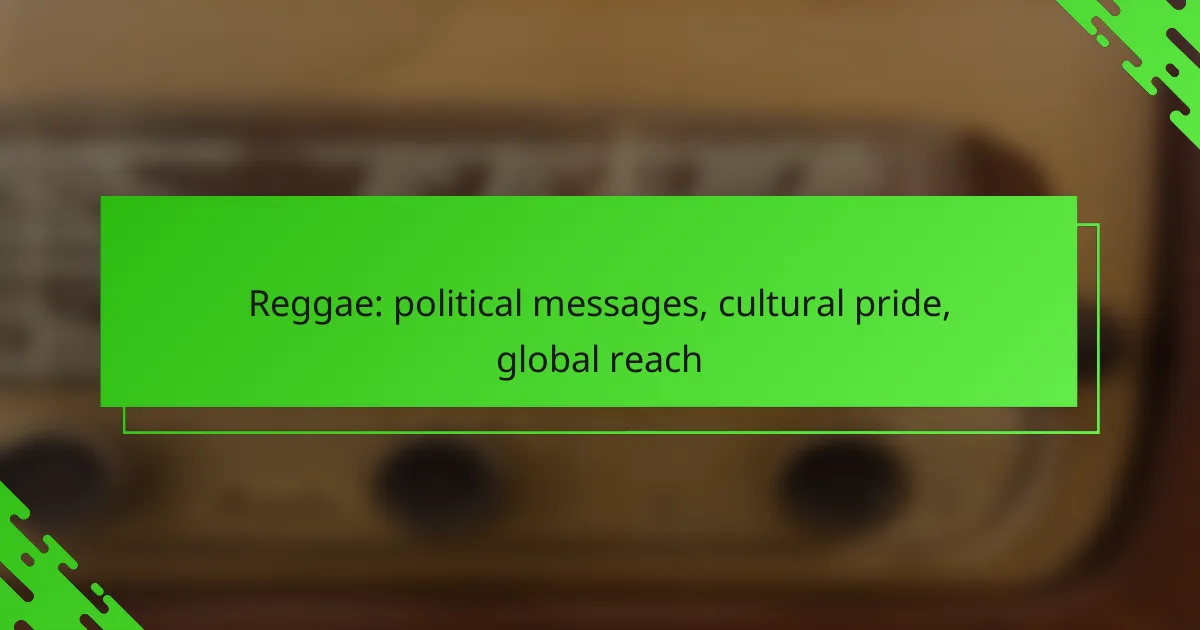Reggae music serves as a vital platform for expressing political messages and cultural pride, particularly in Canada, where artists address social injustices and the struggles of marginalized communities. Celebrating Jamaican identity and resilience, reggae fosters a sense of belonging and unity among listeners. Its unique sound and themes of resistance and social justice have achieved global reach, resonating with diverse audiences around the world.
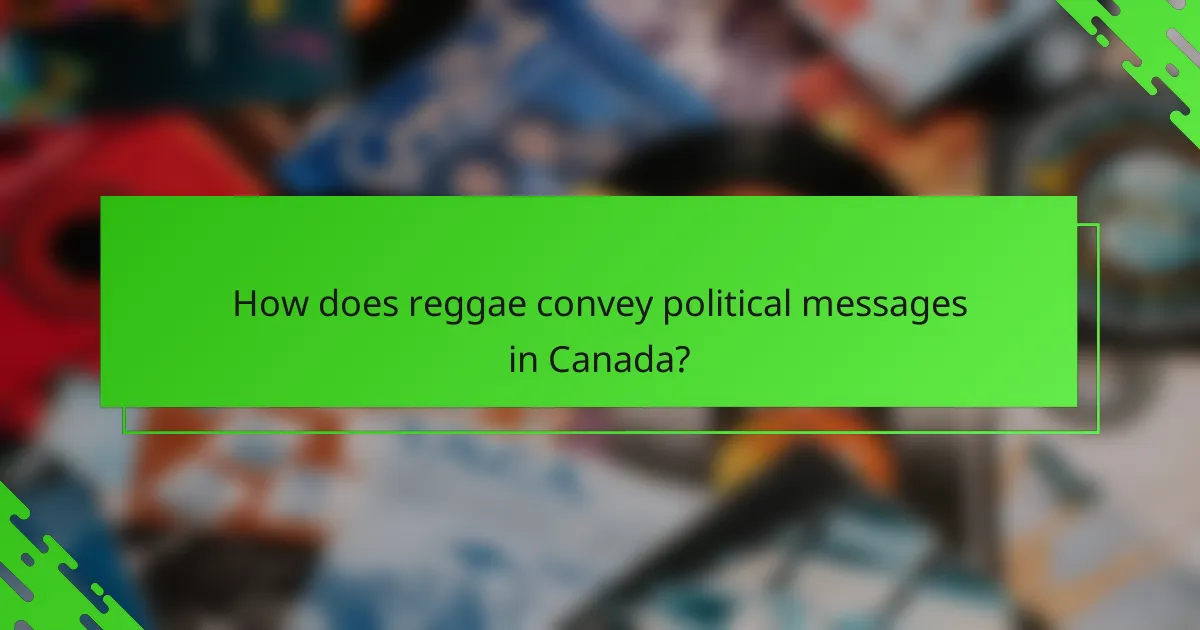
How does reggae convey political messages in Canada?
Reggae in Canada serves as a powerful medium for expressing political messages, often addressing social injustices and cultural pride. Canadian reggae artists utilize their music to highlight issues such as inequality, discrimination, and the struggles of marginalized communities.
Protest songs addressing social issues
Protest songs in reggae often tackle pressing social issues like poverty, racism, and police brutality. These songs resonate with listeners by reflecting their experiences and frustrations, creating a sense of solidarity among those affected. For example, tracks may call for justice or highlight systemic inequalities faced by Black Canadians.
Many reggae artists incorporate storytelling in their lyrics, making the messages relatable and impactful. This approach not only raises awareness but also encourages listeners to engage in activism and community organizing.
Influence of Rastafarian beliefs
Rastafarian beliefs significantly influence reggae music, promoting themes of resistance and empowerment. The Rastafarian movement emphasizes social justice, equality, and the importance of African heritage, which are often woven into the lyrics of reggae songs. This spiritual foundation inspires artists to address political issues through a lens of cultural pride.
Rastafarian symbols and language, such as references to Zion and Babylon, serve as metaphors for the struggle against oppression. This cultural context enriches the political messages in reggae, making them more profound and resonant for listeners.
Examples of Canadian reggae artists
Several Canadian reggae artists have made significant contributions to the genre while addressing political themes. Artists like K’naan and Dubmatix incorporate social commentary into their music, reflecting the realities of life in Canada. K’naan, for instance, often discusses his experiences as an immigrant, shedding light on broader societal issues.
Other notable artists include the band The Meditations and singer-songwriter Tanya Mullings, who both use their platforms to advocate for social change. Their work demonstrates the diverse ways reggae can convey political messages while fostering cultural pride within Canadian society.
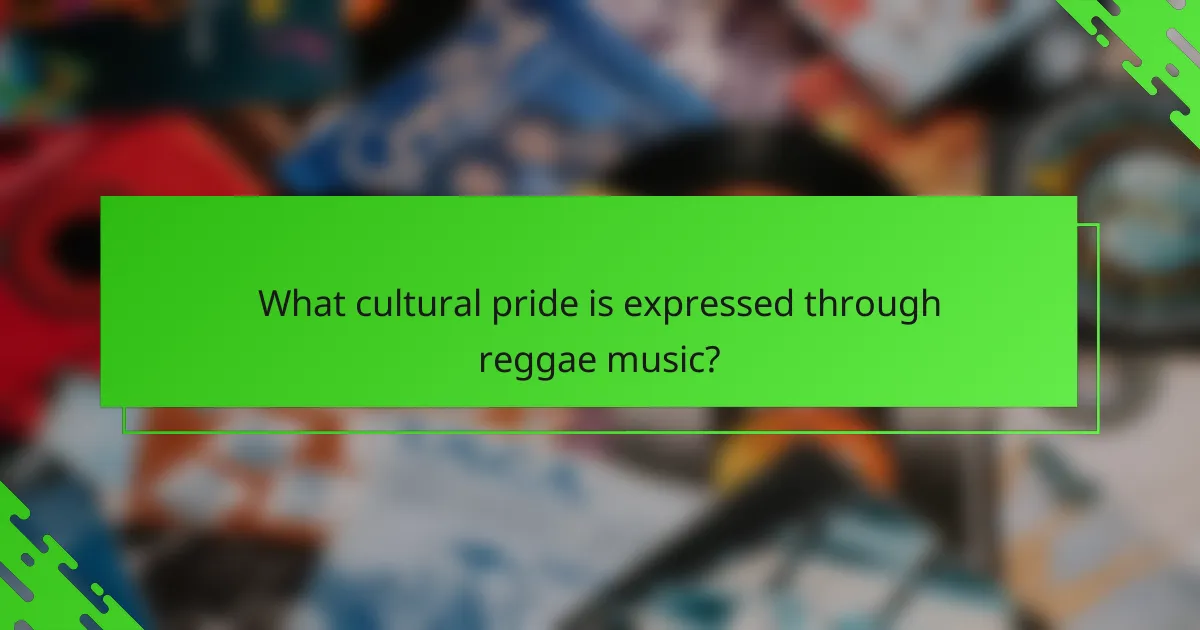
What cultural pride is expressed through reggae music?
Reggae music embodies cultural pride by celebrating Jamaican identity, history, and resilience. It serves as a powerful medium for expressing social and political messages, fostering a sense of belonging and unity among its listeners.
Celebration of Jamaican heritage
Reggae music is deeply rooted in Jamaican culture, reflecting the island’s rich history and traditions. Artists often incorporate elements of Rastafarian beliefs, local dialects, and references to historical events, which resonate with both Jamaicans and global audiences. This connection to heritage instills pride and reinforces cultural identity.
Popular reggae songs frequently highlight themes such as love for the land, community solidarity, and the struggles faced by the Jamaican people. These themes not only celebrate Jamaican heritage but also invite listeners to appreciate the broader cultural context.
Impact on identity among Caribbean Canadians
For Caribbean Canadians, reggae music plays a significant role in shaping cultural identity and community ties. It acts as a bridge connecting individuals to their roots, fostering a sense of pride in their heritage while navigating life in a multicultural society. Reggae festivals and events often serve as communal gatherings that reinforce these connections.
Through reggae, Caribbean Canadians express their unique experiences and challenges, creating a space for dialogue about identity, belonging, and cultural representation. This music genre empowers individuals to embrace their heritage while contributing to the diverse Canadian cultural landscape.
Reggae festivals promoting cultural awareness
Reggae festivals around the world, including those in Canada and Europe, promote cultural awareness by showcasing Jamaican music and traditions. These events attract diverse audiences, providing an opportunity for cultural exchange and education about reggae’s roots and significance.
Festivals often feature not only music but also art, food, and discussions on social issues, enhancing understanding of the cultural context behind reggae. Attendees can experience the vibrancy of Jamaican culture firsthand, fostering appreciation and respect for its contributions to global music and society.
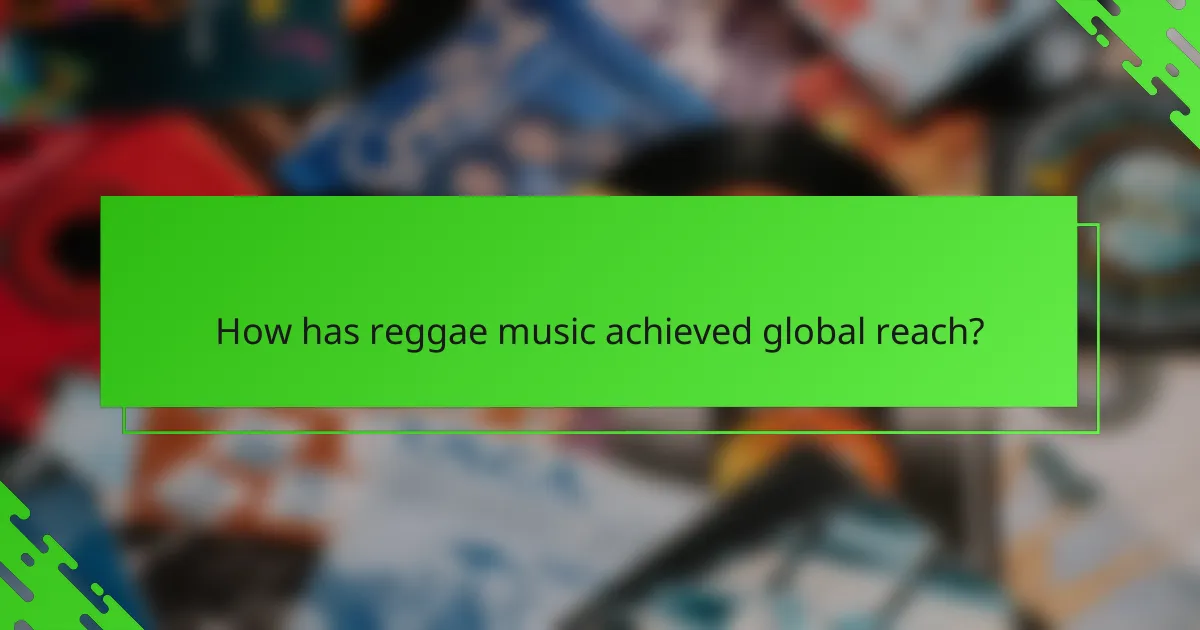
How has reggae music achieved global reach?
Reggae music has achieved global reach through its unique sound, cultural messages, and the ability to resonate with diverse audiences. Its themes of resistance, love, and social justice have transcended geographical boundaries, making it a powerful medium for expression worldwide.
Influence on international music genres
Reggae has significantly influenced various international music genres, including hip-hop, rock, and pop. Elements such as the offbeat rhythm and bass-heavy sound have been incorporated into countless tracks, creating a fusion that appeals to a wide range of listeners.
Artists like The Police and Eric Clapton have drawn inspiration from reggae, showcasing its versatility and impact. This cross-genre blending has not only popularized reggae but also enriched other music styles with its distinctive characteristics.
Global collaborations with artists
Collaborations between reggae artists and musicians from different genres have further expanded reggae’s global presence. Notable partnerships include those between Jamaican artists and American hip-hop stars, which have introduced reggae to new audiences.
These collaborations often result in innovative tracks that blend styles, such as the work of Sean Paul with pop icons like Beyoncé. Such efforts highlight reggae’s adaptability and its ability to connect with fans across cultural divides.
Streaming platforms expanding audience
Streaming platforms have played a crucial role in expanding the audience for reggae music. Services like Spotify and Apple Music allow users to discover reggae tracks easily, leading to increased listenership worldwide.
Playlists dedicated to reggae and its subgenres help introduce new listeners to the music, while algorithms suggest reggae tracks to users based on their listening habits. This accessibility has made reggae more mainstream, reaching millions of potential fans globally.
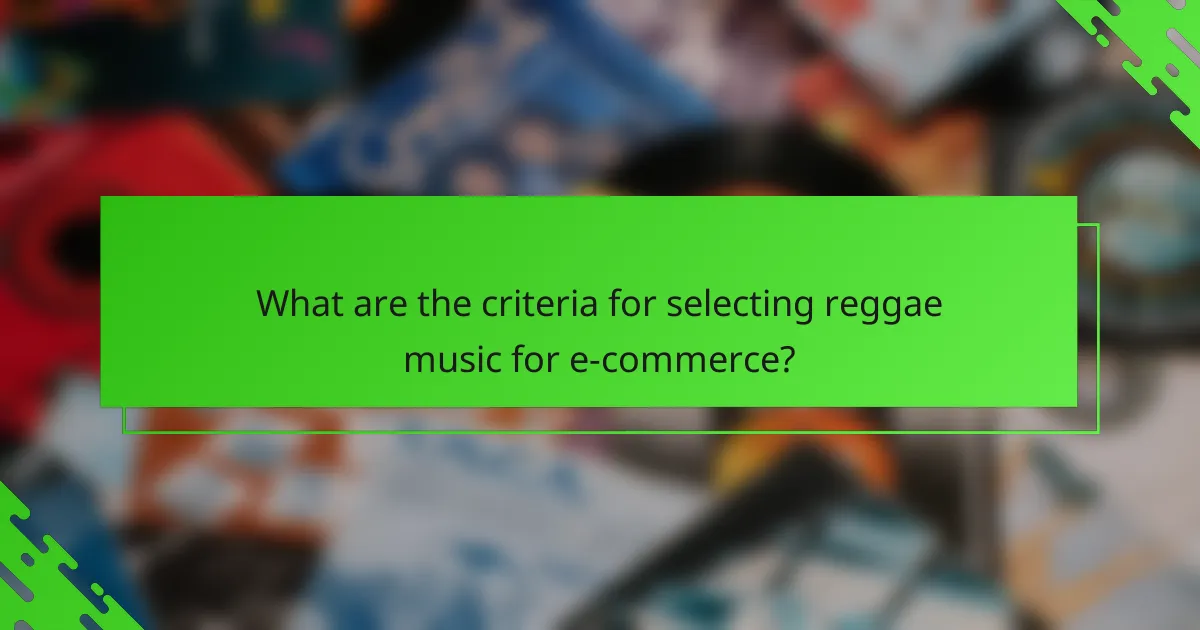
What are the criteria for selecting reggae music for e-commerce?
When selecting reggae music for e-commerce, it’s essential to consider the authenticity of the artist, the quality of production, and the popularity and reviews of the music. These criteria ensure that the music resonates with audiences and maintains the genre’s cultural integrity.
Authenticity of the artist
Authenticity is crucial in reggae music, as it reflects the artist’s connection to the genre’s roots and cultural significance. Look for artists who have a genuine background in reggae, often demonstrated through their lyrics, style, and community involvement. Established artists with a history of impactful music are typically more appealing to buyers.
Consider artists who are recognized within the reggae community, such as those with ties to Jamaica or who have collaborated with well-known reggae musicians. This connection can enhance the perceived value of their music in an e-commerce setting.
Quality of production
The quality of production plays a significant role in the appeal of reggae music. High-quality recordings that capture the essence of reggae’s sound—such as the rhythm, instrumentation, and vocal clarity—are more likely to attract buyers. Look for music that has been produced by reputable studios or producers known for their work in the reggae genre.
Additionally, consider the mixing and mastering processes, as these can greatly affect the listening experience. Music that sounds polished and professional will stand out in a crowded marketplace.
Popularity and reviews
Popularity and reviews are important indicators of a reggae track’s marketability. Check platforms like Spotify, Apple Music, or Bandcamp for streaming numbers and listener engagement. Tracks that have gained traction often have a built-in audience, making them more likely to sell well in an e-commerce environment.
Pay attention to customer reviews and ratings on e-commerce platforms. Positive feedback can provide insights into the music’s appeal and help potential buyers make informed decisions. Aim for music that has received favorable reviews from both critics and fans alike.
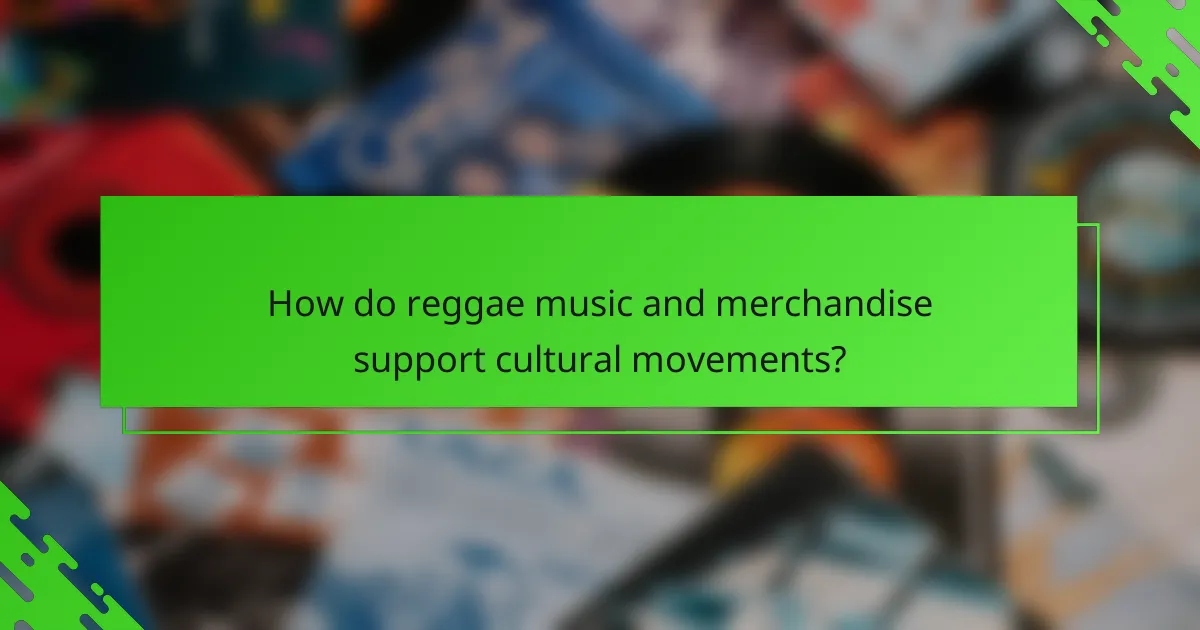
How do reggae music and merchandise support cultural movements?
Reggae music and its associated merchandise play a crucial role in supporting cultural movements by raising awareness and funding for social causes. Through the sale of music and related products, artists and organizations can promote messages of empowerment and pride while directly contributing to community initiatives.
Sales funding social initiatives
Sales from reggae music and merchandise often provide essential funding for various social initiatives, particularly in communities where the genre originated. For instance, a portion of album sales or concert proceeds may be allocated to educational programs, health services, or community development projects.
Artists may collaborate with non-profit organizations to ensure that funds are directed toward impactful causes. This partnership not only enhances the visibility of the initiatives but also fosters a sense of community ownership and pride.
Merchandising as a form of activism
Merchandising in reggae culture serves as a powerful form of activism, allowing fans to express their support for social justice and cultural pride. Items such as clothing, accessories, and artwork often feature messages that resonate with the struggles and aspirations of marginalized communities.
By purchasing and wearing reggae merchandise, individuals not only promote the artists but also spread awareness about important issues. This act can create a ripple effect, encouraging conversations and inspiring others to engage with the cultural movements represented by the music.
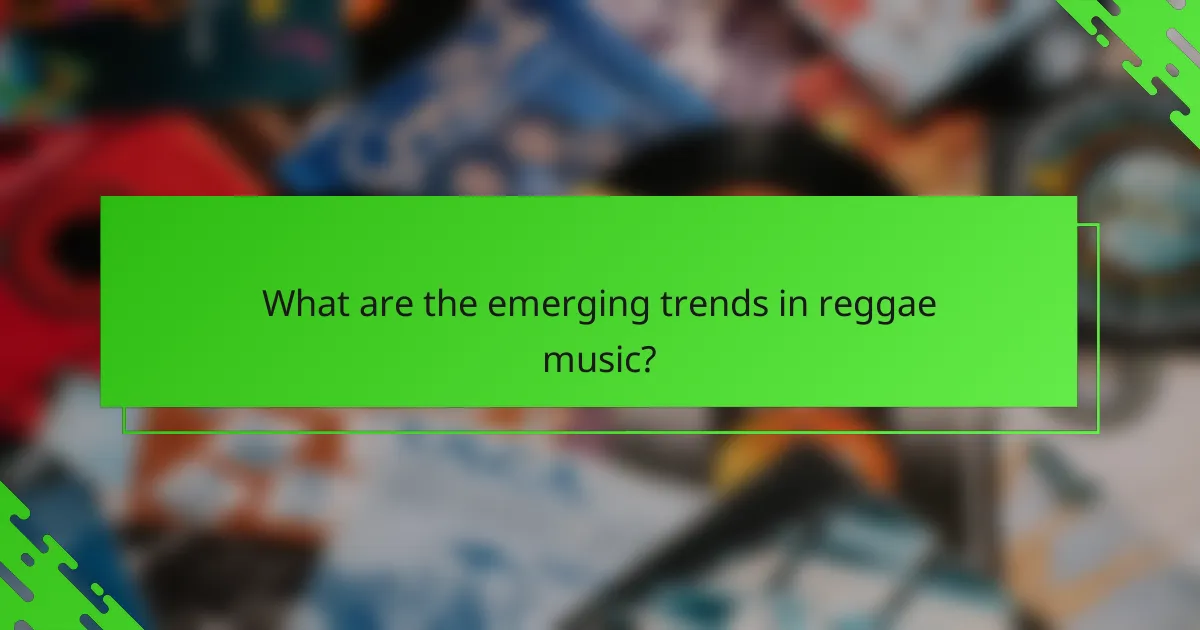
What are the emerging trends in reggae music?
Emerging trends in reggae music include a notable fusion with various genres and increased representation in mainstream media. These developments reflect the genre’s adaptability and its growing influence on a global scale.
Fusion with other genres
Reggae is increasingly blending with genres such as hip-hop, rock, and electronic music, creating innovative sounds that attract diverse audiences. This fusion allows reggae artists to reach new listeners while maintaining the core elements of the genre.
For example, artists like Major Lazer incorporate reggae rhythms into electronic dance music, while others, like Protoje, merge reggae with hip-hop influences. This cross-genre collaboration not only revitalizes reggae but also showcases its versatility.
Increased representation in mainstream media
Reggae’s presence in mainstream media has grown significantly, with more artists gaining visibility on global platforms. This trend is evident in collaborations with popular artists and features in major film and television productions.
Streaming services and social media have played a crucial role in this expansion, allowing reggae music to reach audiences worldwide. Events like the Reggae Sumfest and international festivals further highlight reggae’s cultural significance and appeal, drawing attention from both fans and industry professionals.
